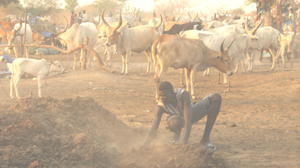White Bull Lager charges into local beer market
SABMiller’s new beverage plant is the first local manufacturing facility in Southern Sudan’s capital city, Juba and has the capacity to brew 180,000 hl of clear beer and 60,000 hl of carbonated soft drinks annually. Up until now, Southern Sudan’s eleven million people only had access to beers and soft drinks imported from neighbouring countries.
The USD 37 million investment will also create employment for hundreds of Sudanese locals and has already employed a large number in the construction of the plant. The local Juba community also has a pioneering land lease agreement with SABMiller that will ensure they receive royalties from the development.
Communities around Juba stand to benefit from the creation of employment and through indirect commercial and related activities and support services.
In a show of corporate social responsibility, the brewery will provide the local communities with clean drinkable water that it has extracted from the Nile and purified.
The Juba investment brings the total number of African countries that SABMiller now have interests in to 35.
SABMiller’s show of confidence in an area devastated by years of civil war comes at a time when a report by the UN’s Food and Agricultural Organisation (FAO) “Land grab or development opportunity?” is raising eyebrows around the world.
Unbeknown to most, developing countries have leased 15 million to 20 million ha of farm land to foreign investors since 2006. That’s a territory equal to the total farming area of France – with an estimated turnover of USD 20 million to USD 30 billion.
According to the study, which concentrates on five African countries – Ethiopia, Ghana, Madagascar, Mali and Sudan – where 2.5 million ha of farm land have been leased out since 2004, agricultural investment is mainly done by Middle-Eastern and Asian countries and companies.
The cheap and abundant African farm land is used to secure the food supply for populations in oil-rich countries with poor agricultural infrastructures. An investment fund from Abu Dhabi, for instance, has leased 28.000 ha in Sudan to produce corn, beans and potatoes for the United Arab Emirates.
Moreover, a consortium of Saudi Arabian agricultural companies has announced it will invest USD 400 million in food production in Sudan and Ethiopia.
Sudan’s conflicts have many causes, but at the root of each conflict are questions over the control and distribution of resources. The most important resource is land: whether exploited for agriculture, cattle-herding or subterranean resources such as oil or water, land ownership is the key to wealth and power.
Source
BRAUWELT International 2009

